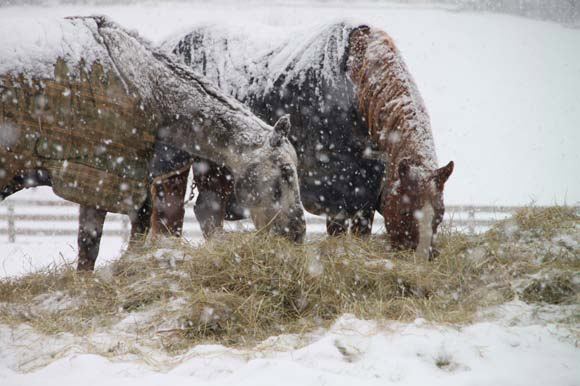 Keeping horses healthy in winter is just as important as keeping
them cool during the summer. Here are some tips to help you keep your equines safe and secure this coming
winter.
Keeping horses healthy in winter is just as important as keeping
them cool during the summer. Here are some tips to help you keep your equines safe and secure this coming
winter.
1. Monitor their food. Switch to concentrates and hay as pasture quality and
accessibility decline. Feed outdoor horses more hay as it helps to produce heat during digestion and add
minerals in the winter to help make sure everyone is getting what they need.
2. Make sure they have a dental checkup before winter rolls around so that
you're sure they're able to grind up their food and receive every available nutrient.
3. Smear the bottom of your horses hooves with vasoline or other petroleum
jelly product and clip heavy coats if horses are ridden often. Be warned, however, that a clipped coat MUST
have a blanket and be stabled as their coat no longer provides natural insulation. In general, if temperatures
become frigid or windy a coat is a good idea. A wet coat will not hold heat and wind pulls heat
away.
4. Keep hooves trimmed. They will chip less and hold less snow as well as
providing more grip on icy or slippery ground. Check under blankets every single day for chaffing or
irritation. Grooming is just as important in the winter months as it is during the spring and
summer.
5. Provide shelter even if they are stabled all night. They may need to get
out of the wind during the day.
6. Deworm regularly and deworm for bot larvae.
7. Make sure that water is available and doesn't freeze over. Consider rubber
buckets. They're more money upfront but last longer.
8. Make sure that bedding and housing is clean and warm while being well
ventilated but free from drafts.
9. If you ride your horse in the winter plan ahead. Remember that winter days
are shorter and prep will take longer. Check the terrain and look for ice or mud that could cause your horse to
slip. A horse that slips risks breaking a leg. Add deicing agents where necessary.
10. Prep your tack by doing things such as warming the bit before you place it
in the horses mouth. Groom them before a ride and consider using an exercise sheet during riding to keep them
from getting too cold. Tack up in a location that is not muddy or icy and has good footing. Cool your horse
down properly after a ride. This is the time they can catch a chill so be sure they stay warm and
dry.
Related Articles
Stable Building Tips
Bedding Pros and Cons
Mucking Out Your Horse's Stall
Feeding Your Horse
What To Feed Your Horse
Giving Up Your Horse
Horse Grooming
Do Horses Need Shoes?
Teeth and Horses
Winterizing Your Barn
Preparing to Travel With Your Horse
Winter Care for Horses
Preventing Barn and Stall Boredom
Tips for Traveling with Your Horse
Stable Requirements: Building
the Space to Meet Your Horses' Needs
Preparing Your Horse for Hot Weather
Tips for Maintaining Your Horse Trailer
Proper Hoof Care
Why Braiding Horse Hair is Beneficial to
Their Health
Tips for Taking Care of an Older Horse
How to Keep Your Horse Fed on a Budget
Transitioning Horses from Winter Feed to
Spring Feed
Why You Should Feed Your Horse Flaxseed
Dealing With an Unhappy Horse in Their
Stall